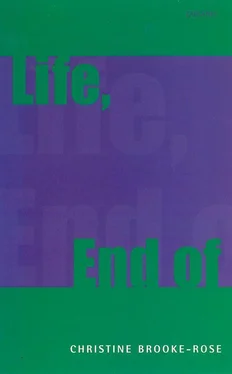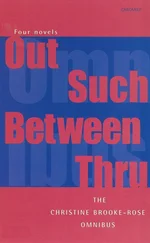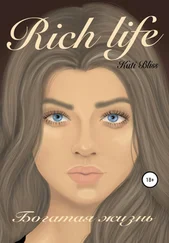Christine Brooke-Rose - Life, End of
Здесь есть возможность читать онлайн «Christine Brooke-Rose - Life, End of» весь текст электронной книги совершенно бесплатно (целиком полную версию без сокращений). В некоторых случаях можно слушать аудио, скачать через торрент в формате fb2 и присутствует краткое содержание. Год выпуска: 2012, ISBN: 2012, Издательство: Carcanet Press Ltd., Жанр: Современная проза, на английском языке. Описание произведения, (предисловие) а так же отзывы посетителей доступны на портале библиотеки ЛибКат.
- Название:Life, End of
- Автор:
- Издательство:Carcanet Press Ltd.
- Жанр:
- Год:2012
- ISBN:9781847775726
- Рейтинг книги:5 / 5. Голосов: 1
-
Избранное:Добавить в избранное
- Отзывы:
-
Ваша оценка:
- 100
- 1
- 2
- 3
- 4
- 5
Life, End of: краткое содержание, описание и аннотация
Предлагаем к чтению аннотацию, описание, краткое содержание или предисловие (зависит от того, что написал сам автор книги «Life, End of»). Если вы не нашли необходимую информацию о книге — напишите в комментариях, мы постараемся отыскать её.
by a master of experimental novels finds the author reflecting on her old age and its effects on her writing. As she reflects on her own career, her experiments with narrative, and on the narrative she writes here, she ultimately reasserts herself and accepts the life behind her.
Life, End of — читать онлайн бесплатно полную книгу (весь текст) целиком
Ниже представлен текст книги, разбитый по страницам. Система сохранения места последней прочитанной страницы, позволяет с удобством читать онлайн бесплатно книгу «Life, End of», без необходимости каждый раз заново искать на чём Вы остановились. Поставьте закладку, и сможете в любой момент перейти на страницу, на которой закончили чтение.
Интервал:
Закладка:
Does her face upcolour? No. She has her rank to rest on, in a way a doctor in mere Language and Literature does not. And as it turns out, the suppression is not provisional at all but permanent. Because, this time explained, the body has enough B12 according to the monthly analysis. So why not mention the analysis in the first place?
Slowly she learns to be less evasive and distant, but it’s a conscious effort on both sides, on the one to be more open, on the other less mocking, but also less demanding of information, not because less curious, but to avoid ruffling her. She has three ways of not answering: one, not answering, as with the blood pressure; two, pseudo-answering, as with the provisional; three, answering but in jargon. Hence fewer questions. And not caring.
Is the doctor O.P.? Not treating her patient as an individual?
No. For at least they both learn. Without saying so. She cannot turn her patient into a non-patient, but can make her less impatient.
Real O.P.s are very different. Oh, friends of course. Not the close true ones, who can imagine the other at all times. Nor the casual ones who have slowly been dropped in the usual and harmless time-space way. But those in between, the professionally familiar and particularly friendly. Long helped and welcomed, then, suddenly, repeatedly thoughtless. Oh, it happens to all of us with the elderly, when we are not yet so, we can’t help seeing them as annulled into a different category. But a true friend would feel it and admit it at once, at least to himherself. O.P.s do not, and the most generous way to drop them is to write a slightly reproachful letter, so that they can do the dropping and feel good about it.
The cause of the office transfer, for instance. To climb upstairs, to the library, with its superb view towards the distant mountains, is more and more paroxysmal, as if all the veins are about to burst. One step at a time, for breath, but like a child for whom each step looks huge, and clinging to one banister with both hands. Not only are most of the books up there, with their charactrifying contacts, but also the office, with its electrifying contacts by computer, and the Xerox, the printer, the filing system. Order. Soon it will be impossible to go up there, except on a stair-climbing chair. It’s the chair that climbs, not the stair.
It is therefore very crushing to make all that effort for nothing, for snipetty tiddlies or non-replies to current questions of curiosity, presumably because now mere. They seem unaware that in true friendship it’s not the length or frequency of a letter that is required, but its relevance. Friends not seen for five, for ten, for thirty years can pick up where they left off, surfing back on a wave-length without sinking, yet bringing all the changes and news, like breakers. So the generous way of dropping is often used. And good friends lost, for physical reasons. Even though these reasons can and probably are interpreted as the behaviour of someone now belonging to a different species. Or trying hard to learn to belong to it. The deepdown original fault lying here. As hinted by the blame-shouldering reproaches and inevitable loss of reputation, But serenity now matters far more than reputation.
So the office is brought down, item by item, and the machines all reconnected, by the lively cleaning girl Valérie and her young husband Gérard, who serves at his brother’s grocery shop in the village, and delivers twice a week, showing that True Friends are not necessarily intellectual. He is only an employee there, because his brother is heir to the shop. This leaves him free to leave when ready, for they aim to be agriculturers, saving and saving to increase their small lots of vineyards and cherry orchards, which they tend and pick themselves. Valérie has a diploma as viticulturist, but for official recognition needs a bit more terrain. They have two small daughters, astonishingly bright and well behaved. Above all, they have humour. It is a daily happiness to see that people like that still exist, though rare, and a strong affection grows between us, indeed they are both invited to dinner, in their car of course, at a favourite restaurant, with a garden and shrieking cicadas. For walking with a cane to the car and from the car to the retaurant table is thank goodness still possible.
The transfer is slow, but perfect. The long white office table takes the place of the sofa, which they remove as a gift. Together with a pretty pink-tiled table and two benches, the tiles in different pinks and even one or two light brown ones to recall the wooden edge and the benches, originally a kitchen table. It has to go because what’s left of the sitting-room, that is, two armchairs and a coffee-table, must replace the table and benches. There is now no table for guests to eat from. Summer guests can still sit round the terrace-table but winter guests must be told not to come, or eat in the armchairs off trays. Trays they must carry. Or stay in a hotel car-far from the village. In other words they can no longer be fetched, so must come by car.
Why do you allot yourself the smallest and least practical room? asks a True Friend from Germany in a previous house, with more rooms. You’re here all the time, they come only for a night or two.
True. Why? Is it generosity or the desire to impress? Unanswerable without tedious analysis. Both probably. The recommended change is made, and later, in this smaller house, the counsel is remembered. The only bedroom in the house part now, is when the guests have a ground-floor room without a view, no sun, made out of the huge double garage, though large and comfortable with own loo and shower. No sun because it faces the stone-wall stair curving inwards and up to the terrace. So this time the guests are sacrificed, Still, at least the room is cool in summer heat.
The delight of Valérie and Gérard with the pink-tiled table and two benches is even more intense than for the sofa, for they can now eat the simpler family meals in their kitchen. But the exchange is mutual, for the carrying down of the office would be totally impossible. It’s chiefly for e-mail. Writing, the old use of the office, is over. At an end. Like life.
Her face looks like a looking-glass, une glace bien encadrée, not a mirror, neither a stage-mirror nor a mirror-stage. Oenone Prentice. She likes to call herself ‘You Only’ or ‘You Know Me’. A nymph. Still learning.
She has come a long way, not, naturally, just for this brief meeting but for others, professionally more alive and useful. By plane from America, by fast train in Europe, by rented car from the station, at the request of her hostess who insists on paying for it.
But why should you pay for it?
Because I have always fetched you and taken you back and no longer can. Please, Oenone. I’m so glad you agreed. With a taxi instead of a car and driver I couldn’t have invited you to dinner last night and I can’t cook any more, I’m unable to stand to peal or stir, unless leaning against the sink or stove, and even that’s difficult. I can’t carry trays or lay the table.
This is several details too many. Of course. Still learning, after five years disabled, though gradually. She accepts the cheque and sits, talking of her work and colleagues in the academic world of literature we still share, at least in the head, along the thirty-year-old friendship.
But learning what?
First, that she can’t quite conceal the long-recognised but knife-twist fact that being out of things is like no longer existing; and second, she’s not interested in real answers to polite questions about coping, with what, or how, in other words, nobody is interested in efforts. Only in results. Just as nobody is interested in Form, only Content. Not the how but the what.
Fine. It’s her absolute right. Life goes on (etc.). Keep asking her about her.
Читать дальшеИнтервал:
Закладка:
Похожие книги на «Life, End of»
Представляем Вашему вниманию похожие книги на «Life, End of» списком для выбора. Мы отобрали схожую по названию и смыслу литературу в надежде предоставить читателям больше вариантов отыскать новые, интересные, ещё непрочитанные произведения.
Обсуждение, отзывы о книге «Life, End of» и просто собственные мнения читателей. Оставьте ваши комментарии, напишите, что Вы думаете о произведении, его смысле или главных героях. Укажите что конкретно понравилось, а что нет, и почему Вы так считаете.












